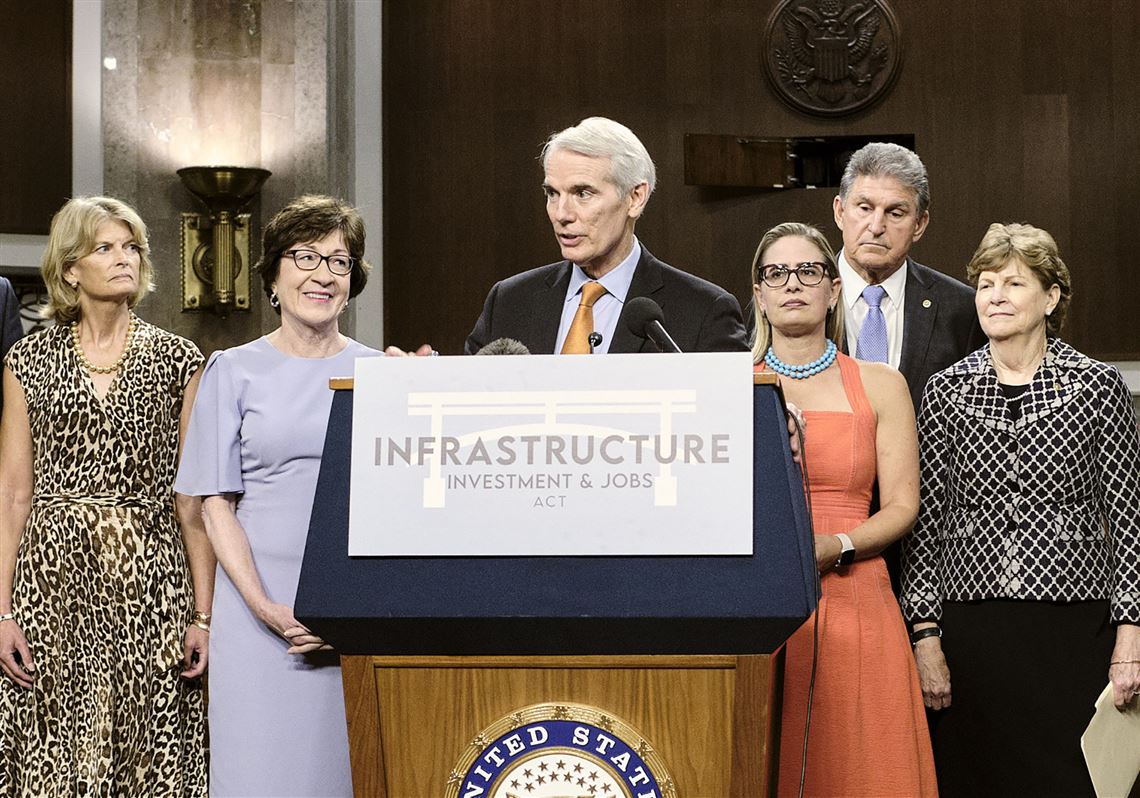A bipartisan group of Senators announced a $1.2 trillion framework with President Biden in June that would include nearly $600 billion in new spending on roads, bridges and broadband. The Senate cleared a major hurdle and voted to move the Bipartisan Infrastructure Plan forward on a strong bipartisan vote of 67-32. All 50 Democrats were joined by 17 Republicans to begin consideration of the $550 billion deal. After the successful vote, President Biden released the following statement.
After grueling and oftentimes, contentious negotiations over the past couple of months between lawmakers and the White House, the Senate finally passed the bipartisan infrastructure plan with broad bipartisan support (a 69-30 vote) advancing President Biden’s economic agenda. “This historic investment in infrastructure is what I believe you, the American people, want, what you’ve been asking for for a long, long time. I want to thank those senators who worked so hard to bring this agreement together. I know it wasn’t easy. For the Republicans who supported this bill, you showed a lot of courage. And I want to personally thank you for that,” said President Biden.
This new infrastructure plan could provide the country’s largest investment in decades. The new spending is designed to create jobs and fix long overdue crumbling infrastructure, and it would also prevent power outages, help rural areas gain access to internet service, and more. It would provide the largest investment towards roads and bridges including:
- $110B: Roads, Bridges and Major Projects
- $66B: Passenger and Freight Rail
- $11B: Highway and Pedestrian Safety
- $39.2B: Public Transit
- $65B: Broadband
- $16.6B: Ports and Waterways
- $25B: Airports
- $55B: Water Infrastructure
- $65B: Power and Grid
- $47.2B: Cybersecurity and Resiliency
- $7.5B: Clean School Buses and Ferries
- $7.5B: Electric Vehicle Charging
- $1B: Reconnecting Communities
- $21B: Addressing Legacy Pollution
- $8.3B: Western Water Infrastructure
Soon after the vote on the bipartisan infrastructure plan, the Senate took the first step towards a $3.5 trillion reconciliation bill, a complimentary partisan plan to the bipartisan infrastructure plan that would include priorities on climate initiatives, paid leave, child care, education and health care that were not in the bipartisan plan. With a razor thin majority, Senate Democrats plan to use a “budget reconciliation process,” which bypasses the chamber’s normal rules requiring 60 votes to pass most legislation. The budget resolution directs committees to craft a bill, with a target date of September 15. After an all-night vote-a-rama on amendments, the measure passed by the Democratic controlled Senate on a party line vote of 50-49.
The Senate is now on recess until the middle of September, while House Majority Leader Steny Hoyer announced that the chamber will return from its current recess on August 23, about a month earlier than previously planned. The House will move to pass the budget resolution. The White House and Democratic leadership have been stern on moving both bills simultaneously, but Speaker Pelosi has faced some pressure from centrists in her party to hold a stand-alone vote on the bipartisan plan. Nine of those moderate Democrats told the Speaker in a letter that they will not vote for the hefty budget resolution until the Senate approved infrastructure bill is signed into law, suggesting that delaying a vote on infrastructure runs the risk of unforeseen events derailing it.
Meanwhile, more than half of the Congressional Progressive Caucus has taken the opposite position, saying they will not vote for the infrastructure bill until they have a social policy measure that would fund their priorities on climate change, education, health care, family leave, child care and elder care. With these defections, it appears that the House is facing a stalemate, lacking the votes to either deliver the infrastructure bill to President Biden’s desk or advance the budget resolution needed to protect the final legislation from Republican obstruction.
Over this past weekend, Speaker Pelosi said she is looking to advance both the bipartisan infrastructure bill and the broader $3.5 trillion budget framework simultaneously. In a letter to her Democratic colleagues on Sunday, the Speaker says she has requested that the House Rules Committee “explore the possibility” of a rule, which governs floor debate, that moves forward the budget resolution and bipartisan infrastructure bill.
It could be weeks, or months before we know the final outcome these two bills.
